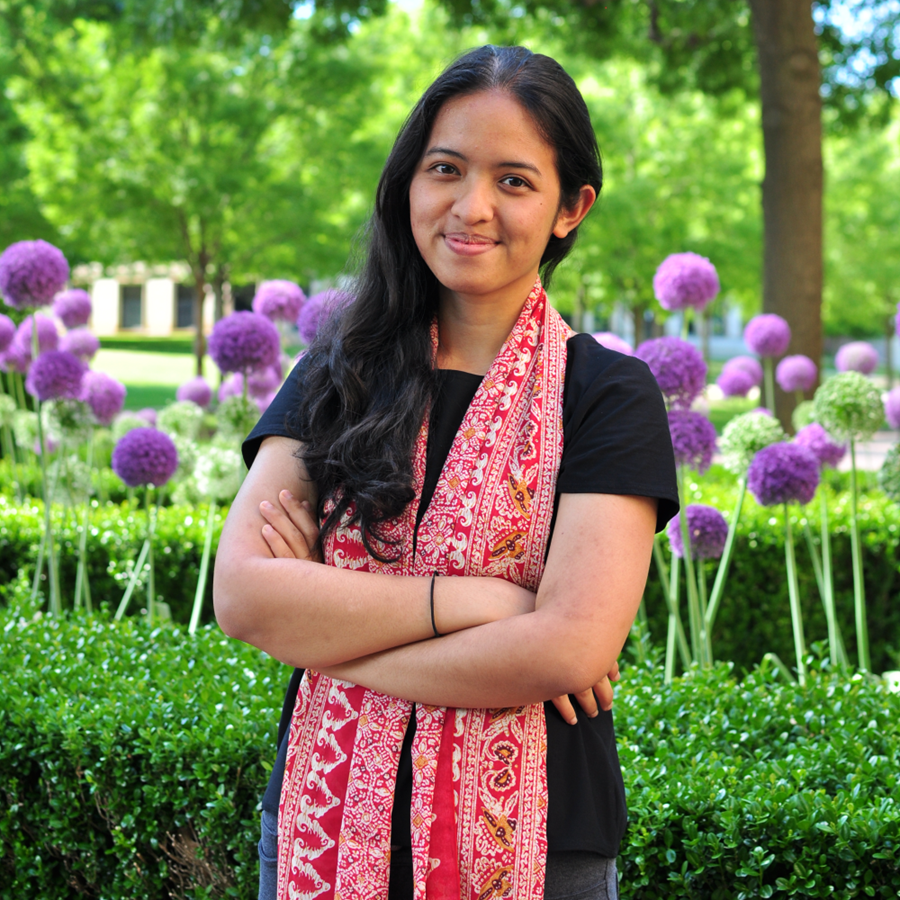An international doctoral student has earned a prestigious fellowship to conduct research to document diets of primates in the wild.
Putu Pujiantari, a doctoral student in environmental dynamics, earned the Franklin Mosher Baldwin Memorial Fellowship, allowing her to travel to Borneo in her home country of Indonesia to conduct research into primate feeding and further study their feeding adaptations in changing climates and habitats.
Despite the dire need for additional research on how climate change affects animals in the wild, impacts of global warming and extreme weather are understudied for primates due to their adaptable nature and broad diet. Pujiantari's work will help fill a void of research around how primates adapt to changing environments.
"The importance of this study is to pinpoint their ecological adaptation, like changes in diet, dispersal patterns, physiological responses and survival, so that we can understand how to protect them from extinction," she said. "Primates are an umbrella species, which means that by protecting them, we indirectly protect many other species that make up the ecological community of their habitat."
Her research continues a childhood passion, when she became interested in nature and wildlife after watching Steve Irwin documentaries. After studying biology as an undergraduate, Pujiantari attended a symposium on primatology, which sparked her curiosity in the field.
"Five of the six speakers were females and from other countries, and all of them had spent more than two decades in Indonesia to study primates," she said. "After the symposium, I started to read journal articles about primates and found out that most primatological research in Indonesia was done by or in collaboration with international researchers. At that point, I decided to no longer be just an attendant - I wanted to become their colleague."
After studying primate feeding behavior for four years in the wild, Pujiantari realized she needed a different perspective on her studies. That led her to the U of A due to Peter Ungar's work on dental microwear, a field of research focusing on inferring diet and behavior in extinct animals that was not yet available in Indonesia.
"It was a great opportunity for me to expand my knowledge, not only about ecology but also feeding ecology from an anthropological perspective," she said. "After I finished my master's degree in anthropology, I became eager to learn about how the digestive system of primates would respond to changes in dietary choice due to climate change and anthropogenically-induced landscape changes."
The Baldwin Fellowship is a prestigious international fellowship intended for students with citizenship in a country where there are limited opportunities for advanced education and research related to human origins.
"The Baldwin Fellowship is the most prestigious award a student from the global south can get to study in fields related to human evolution," said Peter Ungar, distinguished professor of anthropology and director of environmental dynamics. "With this award, Putu joins an elite group including many leading researchers in the discipline. This is a testament to her potential and the promise of her planned research program. The whole Environmental Dynamics program is proud of her."
"I am excited to receive the Baldwin Fellowship, and with its help I hope my research can be used for conservation-related decision making and become a reference for more advanced research in the future," Pujiantari said.
The Environmental Dynamics program is an interdisciplinary program within the Graduate School and International Education that studies the complex interactions between natural systems and human activity. More information is available on the GSIE website.
The Baldwin Fellowships are named after Franklin Mosher Baldwin, a distinguished attorney who took a lively interest in the search for human origins. Hoping to honor her late husband's dual interests in early humans and education, his widow embraced the idea of a program to educate African scholars in prehistory and paleoanthropology. The first Baldwin Fellowships were awarded in 1978. Today, the Fellowship has been expanded to include studies in primatology and is available to citizens from any country that does not have the programs or facilities available to fulfill the students' human origins research goals. More information can be found on The Leakey Foundation website.
Topics
Contacts
John Post, director of communications
Graduate School and International Education
479-575-4853,
